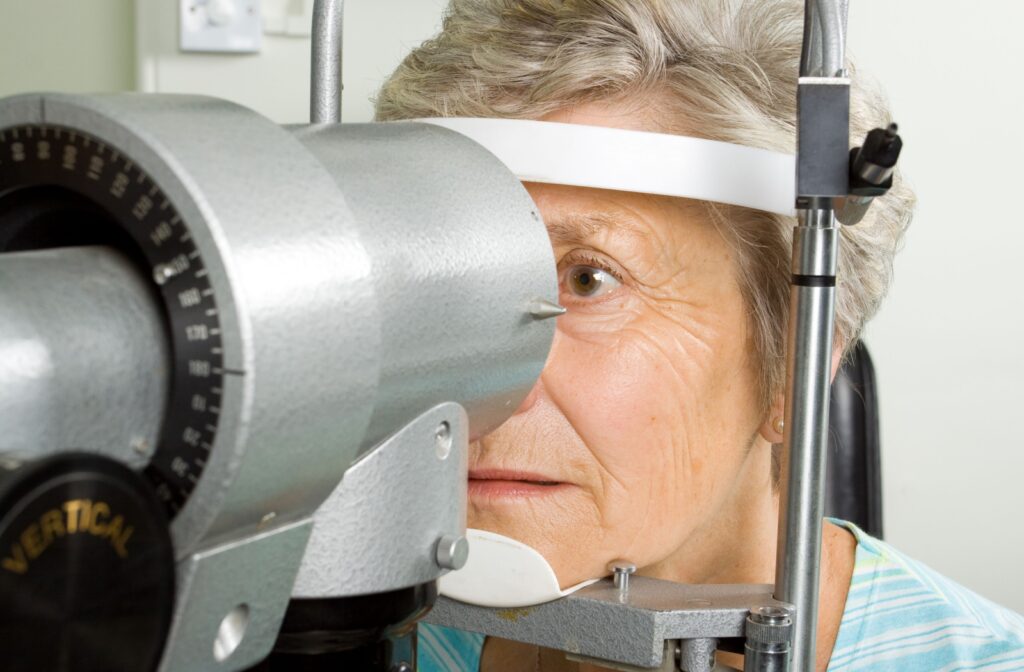Vision changes are often caused by age, medical conditions, or habits that affect how well your eyes function.
Common changes to vision include reading becoming harder, signs seeming blurrier from a distance, or your eyes feeling more tired than usual. While some changes in vision are expected as we age, others point to issues like cataracts, digital eye strain, or underlying health concerns such as diabetes or glaucoma.
Knowing what to watch for helps you take early action. With routine eye exams and healthy daily habits, you can protect your sight and stay ahead of more serious problems.
Understanding Changes in Your Vision
It’s important to note that changes in vision happen for a variety of reasons. While some are a natural part of aging, others can signal underlying medical conditions. Here are some common reasons people experience declining eyesight:
Presbyopia
Presbyopia is a common condition that affects people over 40. It occurs when the lens of the eye gradually loses its flexibility, making it difficult to focus on nearby objects. Symptoms of presbyopia include:
- Difficulty reading small print or screens.
- Holding reading materials farther away to see clearly.
- Eye strain or headaches after close-up tasks.
Fortunately, presbyopia can be managed with prescription eyeglasses, contact lenses, or other treatments recommended by your optometrist.
Cataracts
Cataracts occur when the lens of the eye becomes cloudy, impairing your vision. This condition typically develops slowly over time and can lead to:
- Blurred or dimmed vision.
- Sensitivity to light and glare.
- Difficulty seeing at night.
- Fading or yellowing of colors.
Cataracts are highly treatable through surgery, which replaces the cloudy lens with a clear artificial one, restoring vision in many cases.
Glaucoma
Glaucoma is a group of conditions that damage the optic nerve, often due to increased pressure in the eye. It’s known as the “silent thief of sight” because it tends to develop gradually, often without noticeable symptoms. Types of glaucoma include:
- Open-angle glaucoma, which progresses slowly.
- Angle-closure glaucoma, a more sudden and serious form.
- Normal-tension glaucoma, which occurs even with normal eye pressure.
Regular eye exams are important for detecting glaucoma early, as untreated cases can lead to permanent vision loss.

Age-Related Macular Degeneration (AMD)
AMD affects the macula, the part of the retina responsible for sharp, central vision. It can make tasks like reading and recognizing faces difficult. There are two types:
- Dry AMD, which progresses slowly.
- Wet AMD, which is less common but can cause rapid vision loss if untreated.
Although there’s no cure for AMD, treatments and lifestyle changes can help slow its progression.
Diabetic Retinopathy
This condition affects people with diabetes and occurs when high blood sugar damages blood vessels in the retina. Symptoms include:
- Dark spots or floaters in your vision.
- Blurry or fluctuating vision.
- Impaired night vision.
Diabetic retinopathy can be managed with proper diabetes care and regular eye exams to monitor its progression.
Lifestyle Factors Influencing Vision
Beyond medical conditions and aging, certain lifestyle choices and habits can also play a role in declining vision:
- Screen time: Extended use of digital devices can cause digital eye strain, leading to dryness, headaches, and blurred vision.
- Sun exposure: UV rays can harm your eyes over time, increasing the risk of cataracts and other conditions.
- Smoking: Smoking has been linked to an increased risk of AMD, cataracts, and other eye diseases.
- Poor diet: A diet lacking in essential nutrients like vitamin A, omega-3 fatty acids, and antioxidants can negatively impact eye health.
Adjusting your screen settings, staying hydrated, choosing eye-friendly foods like leafy greens and omega-3s, and wearing sunglasses outdoors can all make a difference to your eye health.
Making these small changes part of your daily routine helps preserve your vision and complements the care you receive from your optometrist. Even simple steps taken today can have a greater impact on your long-term eye health.
How Regular Eye Exams Can Help
A good way of protecting your vision is by scheduling routine eye exams. Here’s why:
- Early detection: Conditions like glaucoma and AMD often have no early symptoms, making regular check-ups highly recommended.
- Customized care: We can recommend personalized treatments and lifestyle changes to support your eye health.
- Updated prescriptions: Vision can change over time, so keeping your prescription up-to-date helps you to see clearly.
- Monitoring overall health: Eye exams can reveal signs of systemic conditions like high blood pressure or diabetes.
At Pinnacle Eyecare, we’re committed to providing comprehensive eye care personalized to your needs.
Take Control of Your Eye Health Today
Your eyesight is an invaluable asset that deserves proper care and attention. If you’ve noticed changes in your vision or simply want to check that your eyes are in good health, we’re here to help. Even small changes in vision can signal the need for expert evaluation and early treatment.
Book an appointment with Pinnacle Eyecare today, and take the first step toward improving your eye health.






